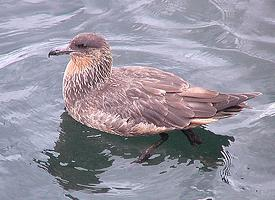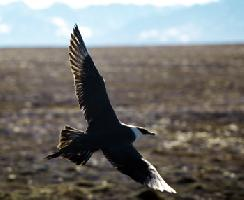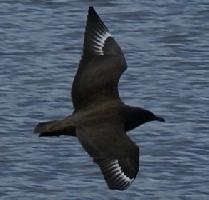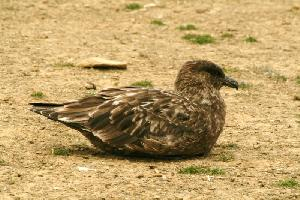
Állatleírás
The Chilean Skua (Stercorarius chilensis), a bird of striking presence and formidable abilities, is a species that commands attention both for its distinctive appearance and its intriguing behaviors. Native to the southern coasts and islands of South America, this bird is a member of the skua family, a group known for their predatory and scavenging habits. The Chilean Skua, in particular, exhibits a range of fascinating characteristics that make it a subject of interest for both ornithologists and bird enthusiasts alike.Physical Description:
The Chilean Skua is a large, robust bird, with adults typically reaching lengths of approximately 53 to 58 centimeters (21 to 23 inches) and boasting a wingspan that can extend up to 132 centimeters (52 inches). Its plumage is predominantly dark brown, with lighter shades on the underparts and a characteristic white wing patch that becomes visible during flight. The bird's head is relatively large with a powerful, hooked beak designed for tearing flesh, reflecting its predatory nature. Its eyes are sharp and keen, suited for spotting prey from great distances. The legs and feet are strong, equipped with sharp talons that are used to grasp and kill its prey.
Habitat and Distribution:
The Chilean Skua is primarily found along the coasts and offshore islands of southern Chile and Argentina, including the Falkland Islands. During the non-breeding season, these birds are known to venture further north, reaching as far as the coasts of Peru and Brazil. Their preferred habitats include open seas, coastal regions, and sometimes inland areas near bodies of water, where they can find ample food sources.
Behavior and Diet:
Renowned for their aggressive behavior, particularly during the breeding season, Chilean Skuas are fearless in defense of their nests and young. They are not hesitant to attack intruders, including humans, if they perceive a threat. These birds are versatile feeders, preying on a wide range of foods. Their diet primarily consists of fish, which they often steal from other seabirds in a behavior known as kleptoparasitism. In addition to fish, they feed on small birds, eggs, carrion, and even small mammals, showcasing their adaptability in terms of diet.
Reproduction:
The breeding season for the Chilean Skua begins in the southern spring, around October and November. They are ground nesters, with a preference for nesting in open areas where they can keep a vigilant eye on potential threats. The female typically lays one to two eggs, which both parents then incubate. The chicks are semi-precocial, born with their eyes open and covered in down, but they rely on their parents for food and protection until they are ready to fledge.
Conservation Status:
Currently, the Chilean Skua is not considered to be at significant risk, and it is classified as Least Concern by the International Union for Conservation of Nature (IUCN). However, like all wildlife, they face threats from habitat destruction, pollution, and the effects of climate change, which could impact their food sources and breeding grounds in the future.
In summary, the Chilean Skua is a fascinating and resilient bird, adapted to a life of predation and survival in the harsh environments of the southern hemisphere. Its impressive physical attributes, coupled with its bold behavior, make it a notable species among the seabirds of South America.
Hasonló állatok
Új állatfotók
Top 10 állat
- Dolphin gull (Leucophaeus scoresbii)
- Japanese macaque (Macaca fuscata)
- Stone loach (Barbatula barbatula)
- Galápagos tortoise (Geochelone nigra complex)
- Russian tortoise (Testudo horsfieldii)
- Diana monkey (Cercopithecus diana)
- Greek tortoise (Testudo graeca)
- Common flying dragon (Draco volans)
- Moustached guenon (Cercopithecus cephus)
- Galápagos penguin (Spheniscus mendiculus)


